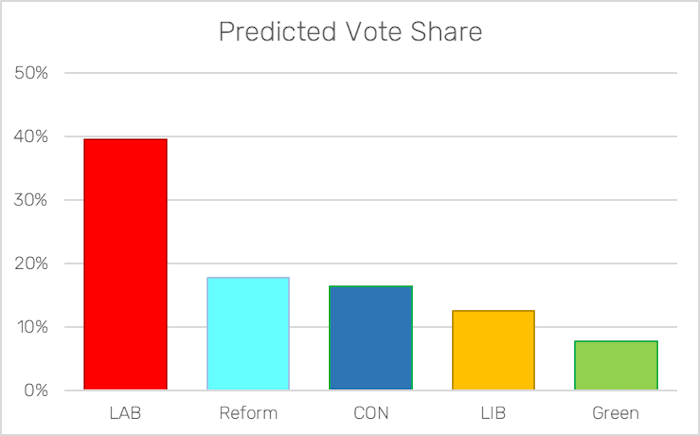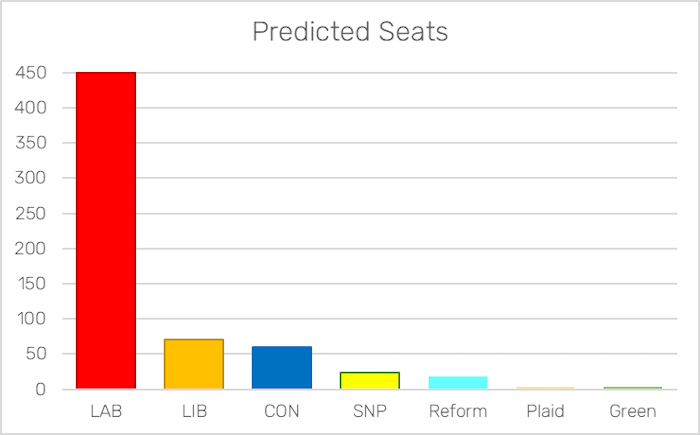Pollsters Electoral Calculus and Find Out Now have conducted a new large-scale MRP poll for the Daily Mirror and GB News. Polling using MRP, which stands for Multi-level Regression and Poststratification, is a relatively recent innovation in polling science which have been used to successfully predict the last two British general elections, and gives the estimated result in each (new) Westminster constituency.
Fieldwork was conducted from 14 June to 24 June 2024, with a sample size of over 19,000 people.
The headline voting intention is:

The headline number of seats predicted to be won by each party is:

The table below gives the prediction in numerical form:
| Party | GE 2019 | Predicted Election Result | ||||
|---|---|---|---|---|---|---|
| Votes | Seats | Votes from poll | Average of recent national polls | MRP Seats | ||
| CON | 45% | 376 | 15% | 20% | 60 | |
| LAB | 33% | 197 | 40% | 40% | 450 | |
| LIB | 12% | 8 | 14% | 11% | 71 | |
| Reform | 2% | 0 | 17% | 18% | 18 | |
| Green | 3% | 1 | 7% | 6% | 4 | |
| SNP | 4% | 48 | 3% | 3% | 24 | |
| Plaid | 0% | 2 | 1% | 1% | 4 | |
| OTH | 1% | 0 | 3% | 2% | 1 | |
Note: The MRP seat analysis was calibrated to match the average of recent national polls, to reduce any poll bias and sampling error.
Our prediction is for a Labour landslide with a majority of 250 seats. The Conservatives are set to lose most of their seats, and will likely have fewer seats than the Liberal Democrats, who will become the Official Opposition.
The Reform party will win around 18 seats, including those of Nigel Farage, Richard Tice and Lee Anderson.
We also have conducted several validation actions and checks to reduce poll bias and sampling error, and to confirm that these seat projections make intuitive sense (see section 3 below).
The forecast Labour victory would be larger than Tony Blair's landslide in 1997 (419 seats) and be the largest win by any party in modern parliamentary history, except for 1931. The 60 seats for the Conservatives would be their worst result since at least 1900.
Twenty-two Conservative Cabinet Members are likely to lose their seats.
Conservative cabinet members who are likely to keep their seats and might contest the next Conservative leadership contest:
The poll used MRP methodology to predict every seat. The poll also prompted respondents with the official list of candidates and parties in their own seat, and asked them to indicate how they are likely to vote at the general election.
No tactical voting adjustments were performed, since it is assumed that any tactical considerations by voters would already be included in their answers to the voting intention question. This differs from our end-of-May poll where not all voters had made their tactical decisions, and there was an adjustment for tactical voting.
The seat-level detail allows some "hyper-local" predictions, such as the prediction that Jeremy Corbyn (ind) will win Islington North.
In five seats with hyper-local candidates, a manual adjustment was made to the predicted votes of the independent candidate to match their likely support. But in no case did this change the predicted seat winner.
In accordance with existing Electoral Calculus methodology, the regression algorithm was given a number of variates based on the respondents' locations, in addition to the variates based on the respondents' demographics. These include:
To verify the correctness of the results, we have done several things to cross-check and validate them.
Around 19% of people who voted Conservative in 2019 didn't know or wouldn't say how they planned to vote this time. That's higher than Labour voters (12%).
Our treatment of these voters is to assume that they will vote in the same way as other Conservatives who did express an opinion. We do not assume that they will all not vote. We think this is a reasonable approach. For comparison, the Labour lead with our assumption is 24%, and the Labour lead with the other assumption (don't knows won't vote) is the same So, the difference may not be that large.
Martin Baxter, founder of Electoral Calculus, said "The Conservatives are predicted to be in third place in terms of both votes and seats. That would be a disaster for them. Labour look set for a massive landslide, but with about one million fewer votes than Jeremy Corbyn got in 2017. More than one voter in every three is going to vote for a party other than Labour or the Tories, which shows many people want change but are not thrilled by Labour."
"Conservative MPs up for re-election might wonder if things would be better for them if they hadn't got rid of Boris Johnson."
Tyron Surmon, Head of Research at Find Out Now, said "These results speak for themselves. It is true that there exist a range of predictions and things can change between now and election day.
"However, when the 'realistic bad' scenario includes the Prime Minister losing his seat, the Conservatives being on-par with Reform, and the Liberal Democrats gaining Official Opposition status, this gives an impression of the position that the Conservative Party is currently in."
Find Out Now polled 19,993 GB adults online between 14-24 June 2024. The sample was weighted to be representative by gender, age, social grade, other demographics and past voting patterns. Regression techniques were used to infer projected seat results.
Find Out Now and Electoral Calculus are both members of the British Polling Council and abide by its rules.
Data tables are available here, including full list of seats.
Electoral Calculus is a pollster and political consultancy specialising in quantitative analysis and modelling for electoral and other market research projects. Its pre-poll prediction for the 2019 general election was the most accurate published forecast. It was founded by Martin Baxter, its CEO.
Electoral Calculus is a member of the British Polling Council and abides by its rules.
Find Out Now is a polling and market research panel with 2.8 million members. Highly profiled respondents can be targeted instantly, with over 100,000 daily responses allowing the delivery of same-day nationally representative sampling.
Find Out Now are members of the British Polling Council and Market Research Society, and abide by their rules.
Modern polling analysis often uses statistical regression techniques to get more accurate and geographically detailed results. Also called MRP (multi-level regression and post stratification) they have been used successfully by Electoral Calculus and other pollsters to predict general elections, local elections and the 2019 European elections.